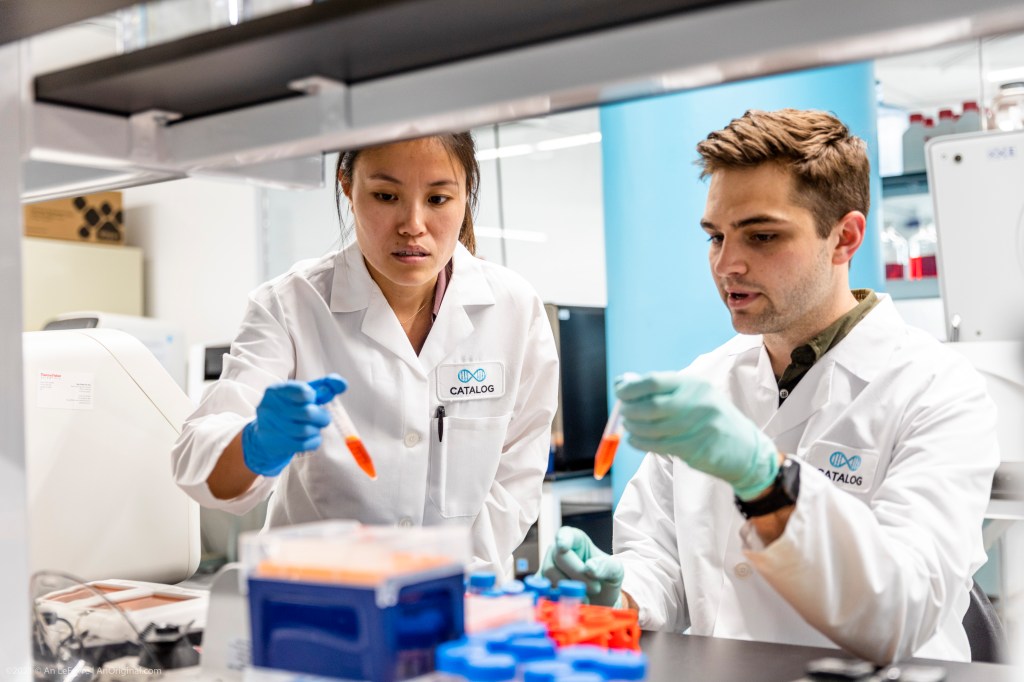Conventional electronic media like flash drives and hard drives require energy consumption to process a vast amount of high-density data and information overload and are vulnerable to security issues due to the limited space for storage. There is also an expensive cost issue when it comes to transmitting the stored data.
To solve the problems of traditional electronic media, a startup in Boston, Catalog, was founded in 2016 by MIT scientists, including co-founder and CEO Hyunjun Park, developing an energy-efficient, cost-competitive and more secure data storage and computation platform by using synthetic DNA.
The startup announced today it has secured a $35 million Series B round to continue developing its DNA-based data computation tools.
South Korea’s Hanwha Impact led the Series B round and was joined by existing backer Hong Kong-based Li Ka-Shing’s Horizons Ventures, CEO Hyunjun Park said in an interview with TechCrunch.
The latest funding will be used to accelerate development of Catalog’s synthetic DNA-powered computing platform, which enables data management, computation and automation. Over the next two to three years, Catalog also plans to put more investment into developing computation functions, Park told TechCrunch. The platform is expected to be commercialized around 2025, Park said.
The company, which is a member of DNA Storage Alliance, will continue to support collaborators and partners of the DNA-based computing system for helping the industry grow, according to Park.
The Series B brings its total funding up to approximately $60 million; Park declined to disclose its valuation. This round comes after a $10 million Series A led by Horizons Ventures in 2020 and a $9 million seed round in 2018 co-led by New Enterprise Associates and OS Fund and other investors, Park said.
While the concept of using DNA as a medium for data storage and computing has been around for years, a lot of the work has been relegated to the academic realm. Catalog has discovered the means to incorporate DNA into algorithms and applications with potential widespread commercial use through its proprietary data-encoding scheme to automation.
“Catalog’s proprietary approach to writing information into DNA, namely its encoding scheme, is revolutionary in that minimal de novo DNA synthesis is required to store a tremendous amount of information. Because the low speed and high cost of DNA synthesis have traditionally been the bottleneck in this field,” Park explained.
Catalog’s custom-developed DNA writer, Shannon, is capable of hundreds and thousands of chemical reactions per second. Shannon, which is designed to write at a speed of over 10MB/sec at full capacity, stores up to 1.63TB of compressed data in a single run.
Expected applications for Catalog’s technology include fraud detection in financial services, image processing for defect discovery in manufacturing and digital signal processing, such as seismic processing in the energy sector.
“Catalog has worked with companies in IT, media, entertainment, and energy sectors. Through this work, we have discovered the broad applicability of our [DNA-based data storage and computing] platform across industries and heavy data users,” Park said. He added that the dozen or so companies working as co-development partners and collaborators are based in the U.S. and Europe.
The IT industry has witnessed a proliferation of purpose-fit technologies over the last several years, including accelerators (GPUs, FPGAs), quantum computers, as well as extreme parallel computers. The advent of the DNA-based computer complements this portfolio, emphasizing low-energy, spatially dense, and secure computing, divorced from the realities and limitations of electronic systems, as per its statement.
“As a reference point, the high-performance computing market is currently about $40 billion annually, and growing rapidly,” Park said when asked regarding the global market size.
“Companies including Microsoft, Twist, Illumina, and Western Digital formed the DNA Storage Alliance earlier this year. Catalog is a member of this organization and is taking this to the next level by focusing on computation and thereby enabling enterprises to generate business value from data that otherwise would have been thrown away or left in cold storage,” Park said.
“Catalog’s technology represents a viable pathway to solve the issue of not only mass data accumulation and preservation but more importantly, the effective usage of data,” said Nick Ha, vice president of Hanwha Impact Partners.
Early this year, Catalog opened an office in Seoul, South Korea, for Asia expansion, Park noted.
Genetics startup Twist Bioscience is working with Microsoft to store the world’s data in DNA































Comment